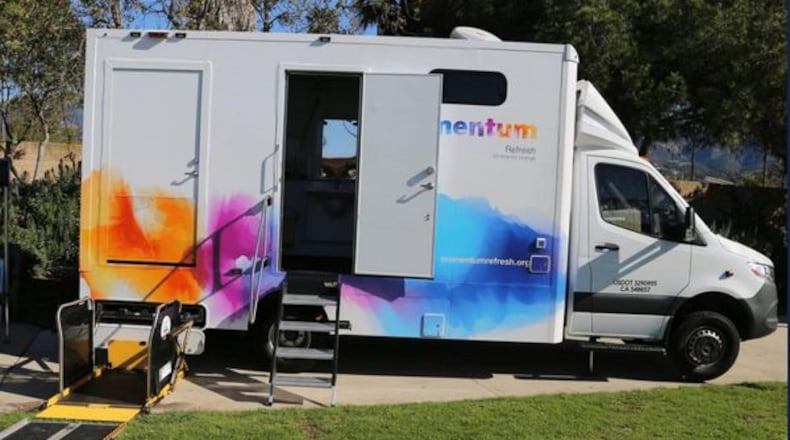The grant will be used for two adult mobile changing tables and restroom set up, which will be available to borrow from the lending library; the purchase and installation of a motorized, adult changing table for on campus; and the purchase of a Refresh Mobile Changing Station Van, training, supplies and support. The changing station comes complete with a wheelchair lift, Hoyer lift and motorized, adjustable changing table.
“These machines are state of the art, and Clark County will be the first county in Ohio to own one, not to mention one of the first in the country. It is a wonderful day for accessibility and inclusion in Clark County,” said Lora Krugh Campbell, community education manager of Developmental Disabilities of Clark County.
Campbell said they learned about the grant on Dec. 1, and she offered to take on the project because of a personal experience. In college, she and a family member experienced the lack of true wheelchair accessibility in a tourist event area and she “never forgot it.”
“Using information regarding the upcoming building code changes in Ohio, as well as general information, like the fact that existing ADA compliant restrooms are estimated to meet only 40% of the needs of people with disabilities, we built a case,” she said. “We also showed how beneficial it would be for a community like Clark County, who has such a rich event and festival history, to have true restroom accessibility at all of those events.”
In March of 2024, the Ohio Building Code will require new assembly and mercantile buildings with six or more male and female water closets to include a family restroom with a height-adjustable adult size changing table inside.
Campbell said she knew they wanted to update their facilities to have the height adjustable changing table on campus and to have mobile ones available through the lending library. She then submitted the proposal on Dec. 11, one day before it was due.
In November, DODD announced the $56 million in ARPA and HCBS fund would be distributed across Ohio to provide more opportunities and better support for Ohioans with developmental disabilities and their families. DODD offered a $14.2 million grant for everything from supporting connections, making communities accessible, providing changing tables and participating in community opportunities. These funds were made available to empower counties to undertake diverse initiatives and projects that offer flexible support and services to people living with disabilities and their families, with a focus on expanding HCBS services to enable access to non-disability-specific environments.
Clark County DD also recently held a ribbon cutting earlier this month for the new Tech Center, Lending Library and Mock Smart Apartment, located at the Van Buren campus.
These programs will provide a place for skills training, trying assistive technology before purchasing it, a mock smart apartment to see technology at work and a computer lab for individual use. They will help people who receive services through Developmental Disabilities of Clark County to know what’s available, to be assessed for what they may need or want, and to help with cost, set up, training and monitoring of all devices.
“This program will allow people to learn about the items on their level, and to determine what works best for them, preventing them from wasting money on just trial and error. If the item is not what you need or want, it is simply returned and the team will discuss other options,” Campbell said.
Anyone who receives services through the Clark County Board of Developmental Disabilities can use the program, but the Assistive Technology Specialist is working on programs that will include local partners such as nursing homes, schools and veterans to help the community embrace technology and make the program more inclusive to others as well.
About the Author


